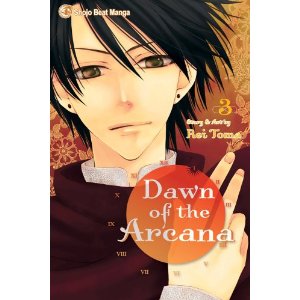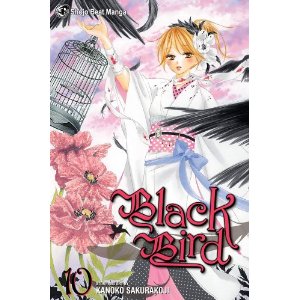Dawn of the Arcana Volume 3 by Rei Toma
I feel like with the third volume things really started to come together nicely in this manga series. The first two volumes were promising, but the third one really has a nice mix of romance, politics, magic, and danger. Nakaba and Caesar start to warm up to each other, but things are even more strained between the red-headed princess and her faithful servant Loki. Things get even worse when Nakaba is instructed to dye her hair before some visiting dignitaries arrive. She chops off her hair instead in a gesture of defiance and Ceasar promptly does the same. The newlyweds now have identical ragamuffin hairstyles. Nakaba is ordered to be confined to her quarters, but she runs into the vising Prince Akhil, the fifth prince of Lithuanel. Akhil recognizes that Nakaba has the power of Arcana and drops some hints about the long-lost tribe that may feature in her origins. He wants her to come back to his country, but Caesar steps in to prevent it. Unfortunately when Caesar steps away later on he’s not able to prevent Nakaba and Loki from being locked up in a dungeon. Nakaba flashes back to Loki’s feelings and experiences when he was all alone trying to protect her when she was an infant and she realizes the depth of his lover for her.
One of the things that intrigued me the most about Dawn of the Arcana when I first picked it up was the situation of a reluctant princess facing down a hostile court. Nakaba had plenty of run-ins in this volume, and the secret passage leading out of her dungeon leads her to discover that her new country has weaponry that will upset the balance of power between nations. Loki immediately sees the weapons as a source of danger for his people, because when humans have better arms and armor, they will no longer need to rely on the strength of the Ajin. Nakaba and Caesar realize that their marriage was a ploy to ensure plenty of time for weapons construction, and Nakaba is determined to do what she can to save the Ajin like Loki. Her power doesn’t seem suited to such a task though, and she doesn’t know what to do.
Nakaba continues to be an engaging heroine, and seeing glimpses of her past with Loki helps the reader understand the deep connection between the two. From being a jerk, Caesar has grown to be a credible match for Nakaba. Part of what makes him more endearing than jerk-like after three volumes is that he doesn’t have the cunning to hide his character flaws. He’s impatient and possessive, but he lights up whenever Nakaba shows him a tiny amount of affection. Even though he isn’t the most well-mannered prince around, it is clear that he actually cares for the bride that he’s so eager to please. The displays of cruelty by the other nobles and the dangerous situations Nakaba finds herself in whenever she leaves her room continue to deliver plenty of dramatic tension. This series keeps getting better.




